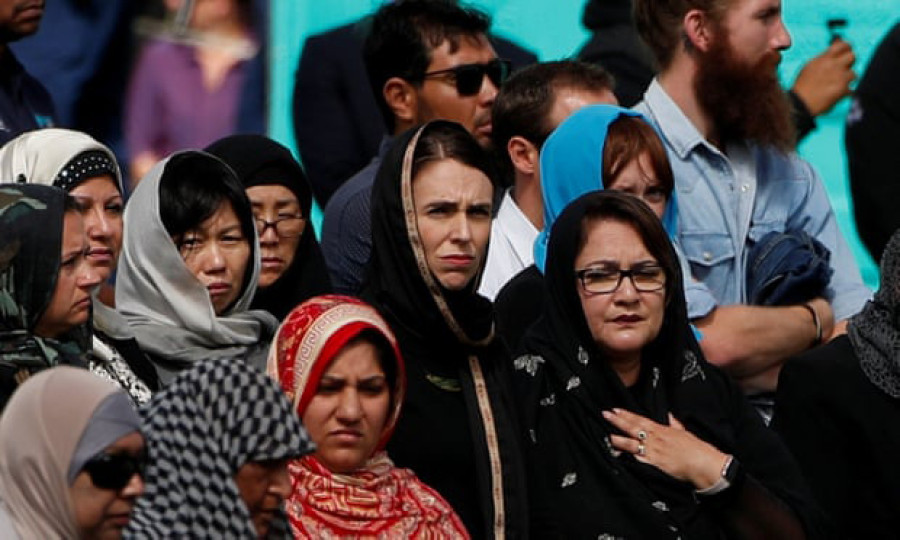Opinion
‘We represent diversity’
Chauvinists can learn from the New Zealand prime minister and change their ways
Pramod Mishra
Even as Nepal was embroiled in a controversy about equal citizenship rights for its women, on the world stage the Christchurch massacre of Muslims during Friday prayers at two mosques by a white supremacist terrorist shook the world. As dastardly as the violence against New Zealand’s Muslims was, its Prime Minister Jacinda Ardern’s response to the massacre came as a light at the end of the Western democracies’ dark tunnel about dealing with minorities.
The massacre took the lives of 50 men, women and children and injured dozens of others. But the prime minister mobilised her people in this small island nation of 5 million people. She reached out to its Muslim minority by empathising with the victims, their families and the Muslim minority as
a whole.
‘Assalaam o Alaikum’
What is empathy? Empathy is identifying with those who suffer, feeling their pain as one’s own. Prime Minister Ardern embraced that which the white supremacist hater hated the most—the different identity of Muslims—by donning the black headscarf of Muslim women, greeting Parliament with the Arabic words ‘Assalaam o Alaikum’ (peace be upon you) and inviting a Muslim cleric into Parliament to recite the Quran. She said that New Zealand was attacked because ‘we represent diversity, kindness, compassion, a home for those who share our values, refuge for those who need it’.
Many Christian New Zealander women defying the white supremacists wore the headscarf and boldly displayed it in public. Last Friday, both men and women New Zealanders of all faiths, taking their cue from the prime minister, wore Muslim dress and offered zumma namaz (Friday prayers) side by side with their Muslim compatriots in the open space outside the mosque where the massacre had taken place. This was an unprecedented act in Western democracies, where despite all the liberal policies about immigration and secular laws to reverse the racial and racist colonial heritage, the colonialism-created 500-year history of racial othering continues both in its blatant as well as latent forms. The prime minister has also announced a ban on all military-style semi-automatic weapons and assault rifles in New Zealand.
Two things we need to remember about Prime Minister Ardern’s groundbreaking act. One, New Zealand, as a European majority settler colony, has charted a different path from other European countries as well as European-settler colonies at a time of crisis. Two, a woman at the helm of affairs can adopt a radically more empathetic approach to subvert and even undo Islamophobia and the legacy of white racism.
In fact, this is a lesson not just for Western democracies but for all countries, whether they are democracies or not. Dealing with minority populations who are deemed as the other of the dominant group within the national imaginary of a nation-state has always been a problem ever since the rise of nationalism in Europe and its hook-line-and-sinker adoption by the rest of the world.
The Muslim majority countries need to see it especially as an example of how a political head of a country can make a difference and undo the racism and ethnocentrism that opportunist politicians and fundamentalists and extremists foster and foment. Just by applauding Premier Ardern’s groundbreaking gestures from a distance will not do; they need to act similarly toward their own minorities.
One can just look around the religion- and ideology-dominated countries around the world, whether they are in the Middle East or Africa or South Asia or East Asia, minorities or those who are designated as the other of the majority/dominant group have been treated badly. The nation-state has been imagined in the image of the dominant population, resulting in the othering of the minority and discriminatory practices. This has been the bane of modern nation-states.
Now, let’s return to Nepal. While a woman leader was thus empathising with her country’s minority population and overturning 500 years of Eurocentrism, Nepal’s lawmakers led by its communist prime minister and his male chauvinist comrades were engaged in making laws that would make its women unequal to men in citizenship: A mother can’t get her children the citizenship card by herself; she has to bring the father of her child to testify his relationship before the child receives citizenship.
A Nepali man can marry a foreign woman and his wife will get citizenship sooner than a Nepali woman’s foreign husband.
Not only that, such a Nepali man’s children will get higher grade citizenship (citizenship by ancestry rather than by naturalisation) than his sister’s children who marries a foreigner (citizenship by naturalisation only).
After having gone through a flawed constitution, the country has been facing a struggle between its half-educated and barely literate parliamentarians and the consciousness-raising media, enlightened women and their supporters about equal citizenship rights between
men and women. These politicians, with notable exceptions, from the mainstream parties are turning into law their gender prejudices born of their
cultural upbringing in the ancient regime of Nepal—Hindu orthodoxy and feudal polity.
Gender and ethnic prejudices
Their deep-seated gender and ethnic prejudices have found new life in the guise of national security. They truly believe that Indian males will lure Nepali women into marrying them and swamp Nepal with nephews and nieces and take away all the golden opportunities. So, to protect Nepal’s national security and its one-ethnic monopoly, they are willing to discriminate against their sisters and daughters. When their sons, brothers and they themselves marry foreign brides, their national security remains unaffected, but if their daughters and sisters marry foreigners, their national security will be compromised. And the believers in this prejudice are not just the back benchers in the Nepali Parliament but the top leaders of the ruling and opposition parties. And all the enlightened, highly educated Nepalis are supposed to just stand and applaud these gender and ethnic chauvinists.
Gender and ethnic prejudices exist both in the West and the non-West. The New Zealand Prime Minister is a beacon in dealing with the other; she is a challenge to chauvinists everywhere. Nepal’s as well as the West’s chauvinists can learn a thing or two from her and change their ways. Enlightened intellectuals and activists in both places are not going to sit idle and allow prejudices to create inequality, abuse and violence.
- Mishra is the department chair of English Studies at Lewis University in the United States.




 9.6°C Kathmandu
9.6°C Kathmandu










